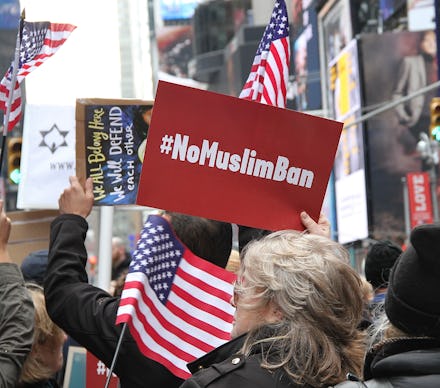Donald Trump just signed a revised Muslim ban

President Donald Trump signed a revamped version of his botched travel ban on Monday, hoping that tweaks to the executive order will withstand the all-but-certain legal challenges the policy stands to face.
"This revised order will bolster the security of the United States and her allies," Secretary of State Rex Tillerson said at a news conference Monday morning.
Attorney General Jeff Sessions added during the news conference that the order "is a lawful and proper exercise of presidential authority."
The new travel ban won't go into effect until March 16.
And it's similar to the original order — which suspended the issuance of visas to citizens from seven majority-Muslim countries, placed a temporary ban on refugees from across the globe, and indefinitely banned the acceptance of Syrian refugees.
Gone, however, is the inclusion of Iraq as one of the nations whose citizens and refugees are temporarily banned from entering the United States.
The new ban also removes the indefinite ban on Syrian refugees, holding them now to the same 120-day pause as refugees from other nations.
The initial travel ban — which critics contended was Trump making good on a promise to ban Muslim immigrants from the U.S. — caused a litany of legal and political trouble for Trump and his administration.
Last month, a three-judge panel upheld a nationwide stay on enforcing the original order, saying it violated the due process of green card and visa holders who had traveled out of the country before the ban was created, and were then detained or deported at airports across the country.
The detention and deportation of legal permanent residents and valid visa holders also sparked massive protests at airports across the country when the ban was first signed.
The new ban now makes clear that those with green cards and valid visas from the countries in the ban are not impacted by the new order.
Trump and his administration contend that the new order will withstand legal scrutiny.
They forcefully pushed back on the initial legal challenges, saying the order was necessary to protect America's national security interests, and said issuing immigration restrictions was within Trump's powers as president.
Trump and his administration added that the legal pause on enforcing the order put national security at risk, saying that giving any notice to refugees and immigrants from the banned nations would allow "many very bad and dangerous people" to enter the country.
Yet despite saying that any delay in enforcing the ban would have serious national security implications for the country, Trump and his team continuously put off signing a new order.
Initially, Trump was slated to sign the order last Wednesday, but delayed it to bask in the afterglow of his joint address — which received positive reviews in the media.
Reports say that the revised ban is coming Monday to put Trump in better spirits, when his joint address faded from the news thanks to Attorney General Jeff Sessions' apparent false testimony about his own communications with Russians during the campaign.
And since the initial ban was blocked from being enforced, a report from Trump's own Department of Homeland Security knocked down the notion that citizens and refugees from the included nations were any more likely to pose a terrorist threat than immigrants from other countries.
The three-page report said that citizenship is an "unreliable indicator of terrorist threat to the United States."